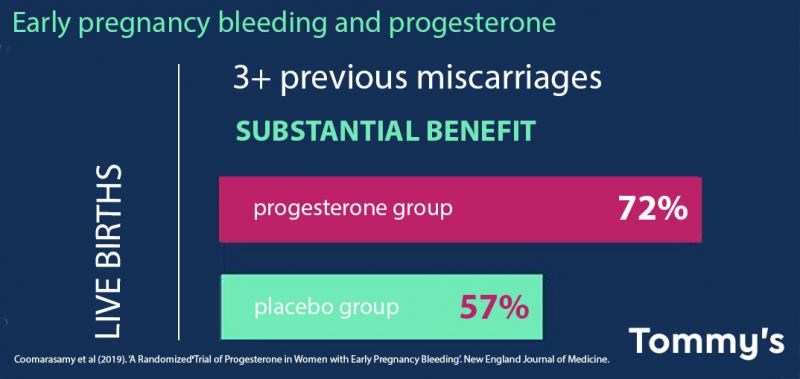New research reveals progesterone could prevent miscarriage for some women
Research from the Tommy’s National Centre for Miscarriage Research suggests that giving progesterone to pregnant women with early pregnancy bleeding and a history of miscarriage could increase their chances of having a baby.
The PRISM trial is the largest ever of its kind and involved 4,153 pregnant women from 48 hospitals across the UK who had early pregnancy bleeding. It was funded by the National Institute for Health Research (NIHR) and co-ordinated in the University of Birmingham in collaboration with Tommy’s National Centre for Miscarriage Research,
The women were randomly assigned by computer into one of two groups – one group of 2,079 women were given progesterone, while the other group of 2,074 women were given a placebo (dummy). Progesterone is a hormone and is essential for maintaining a pregnancy.
The results showed that although the treatment did not reduce the rate of miscarriage for those with no previous miscarriages, there was a small reduction in miscarriage for those with 1–2 previous miscarriages and a big reduction in miscarriage for those with 3 or more previous miscarriages.
While the research did not show statistically strong enough evidence to suggest that progesterone could help all women who are suffering early pregnancy bleeding to go on to have a baby, the results did show the hormone benefited those who had early pregnancy bleeding and had previously suffered a miscarriage.

Arri Coomarasamy, Professor of Gynaecology at the University of Birmingham and Director of Tommy’s National Centre for Miscarriage Research, said: ‘Our finding that women who are at risk of a miscarriage because of current pregnancy bleeding and a history of a previous miscarriage could benefit from progesterone treatment has huge implications for practice. This treatment could save thousands of babies who may have otherwise been lost to a miscarriage.
‘We hope that this evidence will be considered by the National Institute for Health and Care Excellence (NICE) and that it will be used to update national guidelines for women at risk of miscarriage.’
Jane Brewin, Chief Executive of Tommy’s, said: ‘The results from this study are important for parents who have experienced miscarriage; they now have a robust and effective treatment option which will save many lives and prevent much heartache.
‘It gives us confidence to believe that further research will yield more treatments and ultimately make many more miscarriages preventable.’
I have early pregnancy bleeding. Where can I get this treatment?
If you have early pregnancy bleeding and have had one or more previous miscarriages, you should request progesterone treatment. As many clinicians will not have heard of this very recent research, we have developed a simple and clear infographic that you can bring with you to the doctor that clearly explains the benefits of the treatment.
Read more news and blogs
-
Read more about 'Miscarriage care and support in the coronavirus pandemic 'Miscarriage stories
Miscarriage care and support in the coronavirus pandemic
-
Read more about 'For all the little ones we did not get to meet 'Miscarriage stories
For all the little ones we did not get to meet
-
Read more about 'We thought we were having a baby but all we got to take home was a little candle... 'Miscarriage stories
We thought we were having a baby but all we got to take home was a little candle...
-
Read more about 'Recurrent miscarriage and being childless not by choice 'Miscarriage stories
Recurrent miscarriage and being childless not by choice
-
Read more about 'I was so anxious in my pregnancy after loss 'Miscarriage stories
I was so anxious in my pregnancy after loss
